- Home
- Henry James
The Princess Casamassima Page 11
The Princess Casamassima Read online
Page 11
When, therefore, this young lady reappeared, with all the signs of accomplished survival, she could not fail to ask herself whether, under a specious seeming, the phenomenon did not simply represent the triumph of vice. She was alarmed, but she would have given her silver thimble to know the girl’s history, and between her alarm and her curiosity she passed an uncomfortable half-hour. She felt that the familiar, mysterious creature was playing with her; revenging herself for former animadversions, for having been snubbed and miscalled by a peering little spinster who now could make no figure beside her. If it was not the triumph of vice it was at least the triumph of impertinence, as well as of youth, health, and a greater acquaintance with the art of dress than Miss Pynsent could boast, for all her ridiculous signboards. She perceived, or she believed she perceived, that Millicent wanted to scare her, to make her think she had come after Hyacinth; that she wished to inveigle, to corrupt him. I should be sorry to impute to Miss Henning any motive more complicated than the desire to amuse herself, of a Saturday afternoon, by a ramble which her vigorous legs had no occasion to deprecate; but it must be confessed that when it occurred to her that Miss Pynsent regarded her as a ravening wolf and her early playmate as an unspotted lamb, she laughed out, in her hostess’s anxious face, irrelevantly and good humouredly, without deigning to explain. But what, indeed, had she come for, if she had not come after Hyacinth? It was not for the love of the dressmaker’s pretty ways. She remembered the boy and some of their tender passages, and in the wantonness of her full-blown freedom – her attachment, also, to any tolerable pretext for wandering through the streets of London and gazing into shop-windows – she had said to herself that she would dedicate an afternoon to the pleasures of memory, would revisit the scenes of her childhood. She considered that her childhood had ended with the departure of her family from Lomax Place. If the tenants of that obscure locality never learned what their banished fellows went through, Millicent retained a deep impression of those horrible intermediate years. The family, as a family, had gone down-hill, to the very bottom; and in her humbler moments Millicent sometimes wondered what lucky star had checked her own descent, and indeed enabled her to mount the slope again. In her humbler moments, I say, for as a general thing she was provided with an explanation of any good fortune that might befall her. What was more natural than that a girl should do well when she was at once so handsome and so clever? Millicent thought with compassion of the young persons whom a niggardly fate had endowed with only one of these advantages. She was good-natured, but she had no idea of gratifying Miss Pynsent’s curiosity; it seemed to her quite a sufficient kindness to stimulate it.
She told the dressmaker that she had a high position at a great haberdasher’s in the neighbourhood of Buckingham Palace;34 she was in the department for jackets and mantles; she put on all these articles to show them off to the customers, and on her person they appeared to such advantage that nothing she took up ever failed to go off. Miss Pynsent could imagine, from this, how highly her services were prized. She had had a splendid offer from another establishment, in Oxford Street,35 and she was just thinking whether she should accept it. ‘We have to be beautifully dressed, but I don’t care, because I like to look nice,’ she remarked to her hostess, who at the end of half an hour, very grave, behind the clumsy glasses which she had been obliged to wear of late years, seemed still not to know what to make of her. On the subject of her family, of her history during the interval that was to be accounted for, the girl was large and vague, and Miss Pynsent saw that the domestic circle had not even a shadow of sanctity for her. She stood on her own feet, and she stood very firm. Her staying so long, her remaining over the half hour, proved to the dressmaker that she had come for Hyacinth; for poor Amanda gave her as little information as was decent, told her nothing that would encourage or attract. She simply mentioned that Mr Robinson (she was careful to speak of him in that manner) had given his attention to bookbinding, and had served an apprenticeship at an establishment where they turned out the best work of that kind that was to be found in London.
‘A bookbindery? Laws!’ said Miss Henning. ‘Do you mean they get them up for the shops? Well, I always thought he would have something to do with books.’ Then she added, ‘But I didn’t think he would ever follow a trade.’
‘A trade?’ cried Miss Pynsent. ‘You should hear Mr Robinson speak of it. He considers it one of the fine arts.’
Millicent smiled, as if she knew how people often considered things, and remarked that very likely it was tidy, comfortable work, but she couldn’t believe there was much to be seen in it. ‘Perhaps you will say there is more than there is here,’ she went on, finding at last an effect of irritation, of reprehension, an implication of aggressive respectability, in the image of the patient dressmaker, sitting for so many years in her close, brown little den, with the foggy familiarities of Lomax Place on the other side of the pane. Millicent liked to think that she herself was strong, and she was not strong enough for that.
This allusion to her shrunken industry seemed to Miss Pynsent very cruel; but she reflected that it was natural one should be insulted if one talked to a vulgar girl. She judged this young lady in the manner of a person who was not vulgar herself, and if there was a difference between them she was right in feeling it to be in her favour. Miss Pynsent’s ‘cut’, as I have intimated, was not truly fashionable, and in the application of gimp and the distribution of ornament she was not to be trusted; but, morally, she had the best taste in the world. ‘I haven’t so much work as I used to have, if that’s what you mean. My eyes are not so good, and my health has failed with advancing years.’
I know not to what extent Millicent was touched by the dignity of this admission, but she replied, without embarrassment, that what Miss Pynsent wanted was a smart young assistant, some nice girl with a pretty taste, who would brighten up the business and give her new ideas. ‘I can see you have got the same old ones, always: I can tell that by the way you have stuck the braid on that dress’; and she directed a poke of her neat little umbrella to the drapery in the dressmaker’s lap. She continued to patronise and exasperate her, and to offer her consolation and encouragement with the heaviest hand that had ever been applied to Miss Pynsent’s sensitive surface. Poor Amanda ended by gazing at her as if she were a public performer of some kind, a ballad-singer or a conjurer, and went so far as to ask herself whether the hussy could be (in her own mind) the ‘nice girl’ who was to regild the tarnished sign. Miss Pynsent had had assistants, in the past – she had even, once, for a few months, had a ‘forewoman’; and some of these damsels had been precious specimens, whose misdemeanours lived vividly in her memory. Never, all the same, in her worst hour of delusion, had she trusted her interests to such an extravagant baggage as this. She was quickly reassured as to Millicent’s own views, perceiving more and more than she was a tremendous highflyer, who required a much larger field of action than the musty bower she now honoured, heaven only knew why, with her presence. Miss Pynsent held her tongue, as she always did, when the sorrow of her life had been touched, the thought of the slow, inexorable decline on which she had entered that day, nearly ten years before, when her hesitations and scruples resolved themselves into a hideous mistake. The deep conviction of error, on that unspeakably important occasion, had ached and throbbed within her ever since like an incurable disease. She had sown in her boy’s mind the seeds of shame and rancour; she had made him conscious of his stigma, of his exquisitely vulnerable spot, and condemned him to know that for him the sun would never shine as it shone for most others. By the time he was sixteen years old she had learned – or believed she had learned – the judgment he passed upon her, and at that period she had lived through a series of horrible months, an ordeal in which every element of her old prosperity perished. She cried her eyes out, on coming to a sense of her aberration, blinded and weakened herself with weeping, so that for a moment it seemed as if she should never be able to touch a needle again. She lost all interest
in her work, and that artistic imagination which had always been her pride deserted her, together with the reputation of keeping the tidiest lodgings in Lomax Place. A couple of commercial gentlemen and a Welsh plumber, of religious tendencies, who for several years had made her establishment their home, withdrew their patronage on the ground that the airing of her beds was not what it used to be, and disseminated cruelly this injurious legend. She ceased to notice or to care how sleeves were worn, and on the question of flounces and gores her mind was a blank. She fell into a grievous debility, and then into a long, low, languid fever, during which Hyacinth tended her with a devotion which only made the wrong she had done him seem more bitter, and in which, so soon as she was able to hold up her head a little, Mr Vetch came and sat with her through the dull hours of convalescence. She re-established to a certain extent, after a while, her connection, so far as the letting of her rooms was concerned (from the other department of her activity the tide had ebbed apparently for ever); but nothing was the same again, and she knew it was the beginning of the end. So it had gone on, and she watched the end approach; she felt it was very near indeed when a child she had seen playing in the gutters came to flaunt it over her in silk and lace. She gave a low, inaudible sigh of relief when at last Millicent got up and stood before her, smoothing the glossy cylinder of her umbrella.
‘Mind you give my love to Hyacinth,’ the girl said, with an assurance which showed all her insensibility to tacit protests. ‘I don’t care if you do guess that if I have stopped so long it was in the hope he would be dropping in to his tea. You can tell him I sat an hour, on purpose, if you like; there’s no shame in my wanting to see my little friend. He may know I call him that!’ Millicent continued, with her show-room laugh, as Miss Pynsent judged it to be; conferring these permissions, successively, as if they were great indulgences. ‘Do give him my love, and tell him I hope he’ll come and see me. I see you won’t tell him anything. I don’t know what you’re afraid of; but I’ll leave my card for him, all the same.’ She drew forth a little bright-coloured pocket-book, and it was with amazement that Miss Pynsent saw her extract from it a morsel of engraved pasteboard – so monstrous did it seem that one of the squalid little Hennings should have lived to display this emblem of social consideration. Millicent enjoyed the effect she produced as she laid the card on the table, and gave another ringing peel of merriment at the sight of her hostess’s half-angry, half-astonished look. ‘What do you think I want to do with him? I could swallow him at a single bite!’ she cried.
Poor Amanda gave no second glance at the document on the table, though she had perceived it contained, in the corner, her visitor’s address, which Millicent had amused herself, ingeniously, with not mentioning: she only got up, laying down her work with a trembling hand, so that she should be able to see Miss Henning well out of the house. ‘You needn’t think I shall put myself out to keep him in the dark. I shall certainly tell him you have been here, and exactly how you strike me.’
‘Of course you’ll say something nasty – like you used to when I was a child. You let me ’ave it then, you know!’
‘Ah, well,’ said Miss Pynsent, nettled at being reminded of an acerbity which the girl’s present development caused to appear ridiculously ineffectual, ‘you are very different now, when I think what you’ve come from.’
‘What I’ve come from?’ Millicent threw back her head, and opened her eyes very wide, while all her feathers and ribbons nodded. ‘Did you want me to stick fast in this low place for the rest of my days? You have had to stay in it yourself, so you might speak civilly of it.’ She coloured, and raised her voice, and looked magnificent in her scorn. ‘And pray what have you come from yourself, and what has he come from – the mysterious “Mr Robinson”, that used to be such a puzzle to the whole Place? I thought perhaps I might clear it up, but you haven’t told me that yet!’
Miss Pynsent turned straight away, covering her ears with her hands. ‘I have nothing to tell you! Leave my room – leave my house!’ she cried, with a trembling voice.
5
It was in this way that the dressmaker failed either to see or to hear the opening of the door of the room, which obeyed a slow, apparently cautious impulse given it from the hall, and revealed the figure of a young man standing there with a short pipe in his teeth. There was something in his face which immediately told Millicent Henning that he had heard, outside, her last resounding tones. He entered as if, young as he was, he knew that when women were squabbling men were not called upon to be headlong, and evidently wondered who the dressmaker’s brilliant adversary might be. She recognised on the instant her old playmate, and without reflection, confusion or diplomacy, in the fulness of her vulgarity and sociability, she exclaimed, in no lower pitch, ‘Gracious, Hyacinth Robinson, is that your form?’
Miss Pynsent turned round, in a flash, but kept silent; then, very white and trembling, took up her work again and seated herself in her window.
Hyacinth Robinson stood staring; then he blushed all over. He knew who she was, but he didn’t say so; he only asked, in a voice which struck the girl as quite different from the old one – the one in which he used to tell her she was beastly tiresome – ‘Is it of me you were speaking just now?’
‘When I asked where you had come from? That was because we ’eard you in the ’all,’ said Millicent, smiling. ‘I suppose you have come from your work.’
‘You used to live in the Place – you always wanted to kiss me,’ the young man remarked, with an effort not to show all the surprise and agitation that he felt. ‘Didn’t she live in the Place, Pinnie?’
Pinnie, for all answer, fixed a pair of strange, pleading eyes upon him, and Millicent broke out, with her recurrent laugh, in which the dressmaker had been right in discovering the note of affectation, ‘Do you want to know what you look like? You look for all the world like a little Frenchman! Don’t he look like a little Frenchman, Miss Pynsent?’ she went on, as if she were on the best possible terms with the mistress of the establishment.
Hyacinth exchanged a look with that afflicted woman; he saw something in her face which he knew very well by this time, and the sight of which always gave him an odd, perverse, unholy satisfaction. It seemed to say that she prostrated herself, that she did penance in the dust, that she was his to trample upon, to spit upon. He did neither of these things, but she was constantly offering herself, and her permanent humility, her perpetual abjection, was a sort of counter-irritant to the soreness lodged in his own heart for ever, which had often made him cry with rage at night, in his little room under the roof. Pinnie meant that, to-day, as a matter of course, and she could only especially mean it in the presence of Miss Henning’s remark about his looking like a Frenchman. He knew he looked like a Frenchman, he had often been told so before, and a large part of the time he felt like one – like one of those he had read about in Michelet36 and Carlyle.37 He had picked up the French tongue with the most extraordinary facility, with the aid of one of his mates, a refugee from Paris, in the workroom, and of a second-hand dog’s-eared dictionary, bought for a shilling in the Brompton Road, in one of his interminable, restless, melancholy, moody, yet all-observant strolls through London. He spoke it (as he believed) as if by instinct, caught the accent, the gesture, the movement of eyebrow and shoulder; so that if it should become necessary in certain contingencies that he should pass for a foreigner he had an idea that he might do so triumphantly, once he could borrow a blouse.38 He had never seen a blouse in his life, but he knew exactly the form and colour of such a garment, and how it was worn. What these contingencies might be which should compel him to assume the disguise of a person of a social station lower still than his own, Hyacinth would not for the world have mentioned to you; but as they were very present to the mind of our imaginative, ingenious youth we shall catch a glimpse of them in the course of a further acquaintance with him. At the present moment, when there was no question of masquerading, it made him blush again that such a note should be struck
by a loud, laughing, handsome girl, who came back out of his past. There was more in Pinnie’s weak eyes, now, than her usual profession; there was a dumb intimation, almost as pathetic as the other, that if he cared to let her off easily he would not detain their terrible visitor very long. He had no wish to do that; he kept the door open, on purpose; he didn’t enjoy talking to girls under Pinnie’s eyes, and he could see that this one had every disposition to talk. So without responding to her observation about his appearance he said, not knowing exactly what to say, ‘Have you come back to live in the Place?’
‘Heaven forbid I should ever do that!’ cried Miss Henning, with genuine emotion. ‘I have to live near the establishment in which I’m employed.’
‘And what establishment is that, now?’ the young man asked, gaining confidence and perceiving, in detail, how handsome she was. He hadn’t roamed about London for nothing, and he knew that when a girl was as handsome as that, a jocular tone of address, a pleasing freedom, was de rigueur; so he added, ‘Is it the Bull and Gate, or the Elephant and Castle?’
‘A public house! Well, you haven’t got the politeness of a Frenchman, at all events!’ Her good-nature had come back to her perfectly, and her resentment of his imputation of her looking like a bar-maid – a blowzy beauty who handled pewter39 – was tempered by her more and more curious consideration of Hyacinth’s form. He was exceedingly ‘rum’, but this quality took her fancy, and since he remembered so well that she had been fond of kissing him, in their early days she would have liked to say to him that she stood prepared to repeat this graceful attention. But she reminded herself, in time, that her line should be, religiously, the ladylike, and she was content to exclaim, simply, ‘I don’t care what a man looks like so long as he’s clever. That’s the form I like!’

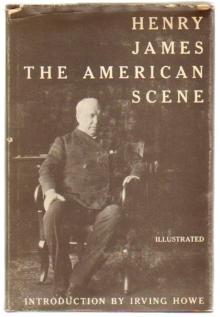 The American
The American The Wings of the Dove, Volume 1 of 2
The Wings of the Dove, Volume 1 of 2 Frost at Midnight
Frost at Midnight Morning Frost
Morning Frost The Portrait of a Lady — Volume 1
The Portrait of a Lady — Volume 1 Fatal Frost
Fatal Frost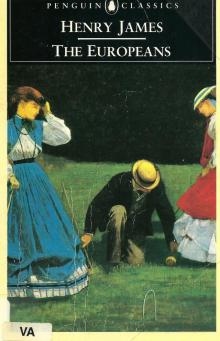 The Europeans
The Europeans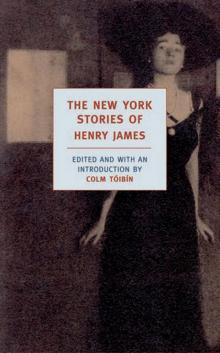 The New York Stories of Henry James
The New York Stories of Henry James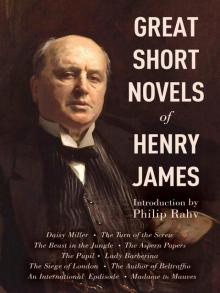 Great Short Novels of Henry James
Great Short Novels of Henry James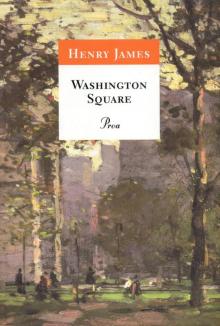 Washington Square
Washington Square The Portrait of a Lady — Volume 2
The Portrait of a Lady — Volume 2 The Ambassadors
The Ambassadors The Wings of the Dove
The Wings of the Dove The Princess Casamassima (Classics)
The Princess Casamassima (Classics) The Coxon Fund
The Coxon Fund First Frost
First Frost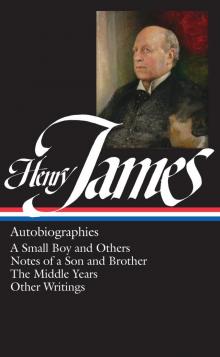 Henry James
Henry James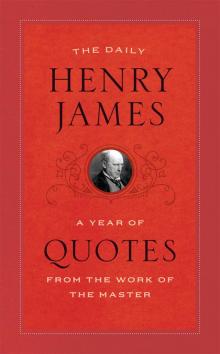 The Daily Henry James
The Daily Henry James Travels With Henry James
Travels With Henry James The Reverberator: A Novel
The Reverberator: A Novel What Maisie Knew (Henry James Collection)
What Maisie Knew (Henry James Collection)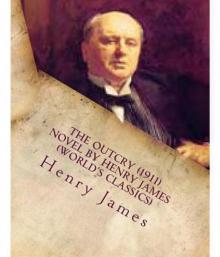 The Outcry
The Outcry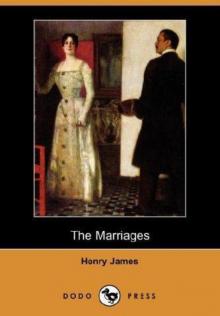 The Marriages
The Marriages The Wings of the Dove, Volume 2
The Wings of the Dove, Volume 2 The Bostonians, Vol. I
The Bostonians, Vol. I The Outcry: -1911
The Outcry: -1911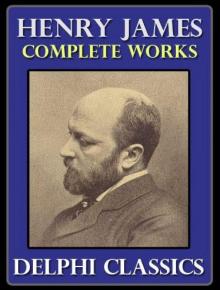 The Complete Works of Henry James
The Complete Works of Henry James Letters from the Palazzo Barbaro
Letters from the Palazzo Barbaro The Pupil
The Pupil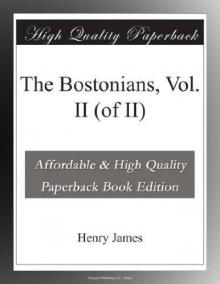 The Bostonians, Vol. II
The Bostonians, Vol. II Pandora
Pandora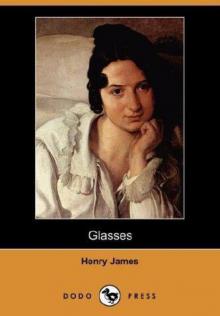 Glasses
Glasses The Princess Casamassima
The Princess Casamassima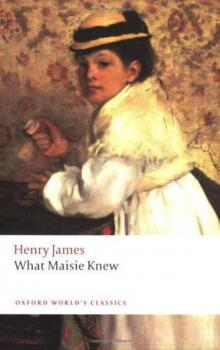 What Maisie Knew
What Maisie Knew The Reverberator
The Reverberator The Golden Bowl - Complete
The Golden Bowl - Complete Confidence
Confidence Wings of the Dove (Barnes & Noble Classics Series)
Wings of the Dove (Barnes & Noble Classics Series) The Spoils of Poynton
The Spoils of Poynton